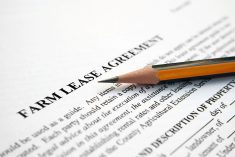Q: I bought a vehicle in the U.S. but the seller refused to accept a certified cheque. I thought that payment on this was guaranteed. I paid a different way, but what was the problem with my certified cheque?
A: You were engaged in a cross-border transaction and many American companies will not accept cheques drawn on a Canadian bank. If you could have arranged to have the certified cheque drawn on a U.S. bank, it might have been accepted. Alternatively, it may just have been this company’s policy not to accept this form of payment. They are not required to do so.
Read Also

Nutritious pork packed with vitamins, essential minerals
Recipes for pork
Your question raises a broader issue of certified cheque security.
Until a recent Ontario court case, certified cheques were seen as almost absolutely secure. Many previous decisions state a certified cheque is “equivalent to cash.”
Established case law stated that once a cheque is certified by a financial institution, the funds are debited from the account and the bank had an obligation to pay the amount on the face of the cheque to the person cashing it.
A 1994 case helped clarify the law in this area. A customer deposited a bunch of cheques to his account, then immediately asked for a certified cheque to pay a bill. The bank did this, on the basis of the recent deposit.
However, some of those cheques bounced and there wasn’t enough money to cover the certified cheque. The bank tried to refuse to pay on that cheque. The court disagreed, and said the bank had to pay it and pursue the customer for a refund.
In 2008, a case wound its way through the Ontario court system and threw all this into disarray. A retired couple owned a house and took a winter vacation in Florida. While away, a phony buyer “bought” their home using mortgage money borrowed from a bank. The owners knew nothing of this until they returned to find they no longer owned their house.
The fake buyer deposited the mortgage money into another account, belonging to a fake seller. That fake seller then took the $450,000 and gave it to another guy who then got three certified cheques from the bank. That guy took the cheques to yet another crook, who gave the guy $450,000 cash in a paper bag. The cash (less a commission) went to the fake buyer-seller.
The bank that had certified the $450,000 cheques discovered the fraud and stopped payment. The guy who’d got the cheques had deposited them to his own foreign bank.
He sued the Canadian bank, saying once those cheques were certified, they were the same as cash to him. Initially, he won, relying on existing case law.
The Ontario Court of Appeal reversed this decision. Obviously the court’s sympathy was not with the crooks but with the bilked couple, which makes sense. What doesn’t make sense, arguably, is the convoluted legal reasoning the court used to obtain this result.
I won’t go into that reasoning here, but readers should take note that the effect of this decision is that a certified cheque is no longer always equivalent to cash. If the dollar amount is big enough and a bank isn’t sure of its customer, there’s now nothing to prevent that bank from refusing to honour a certified cheque.
So if you’re selling anything such as machinery, livestock or land, it might be wise not to accept a certified cheque as payment. Opt for a bank draft or, if possible, an electronic transfer of funds.
This is a sign that traditional paper transactions are losing favour as a mode of doing business.
Rick Danyliuk is a practising lawyer in Saskatoon with McDougall Gauley LLP. He also has experience in teaching and writing about legal issues. His columns are intended as general advice only. Individuals are encouraged to seek other opinions and/or personal counsel when dealing with legal matters.
















